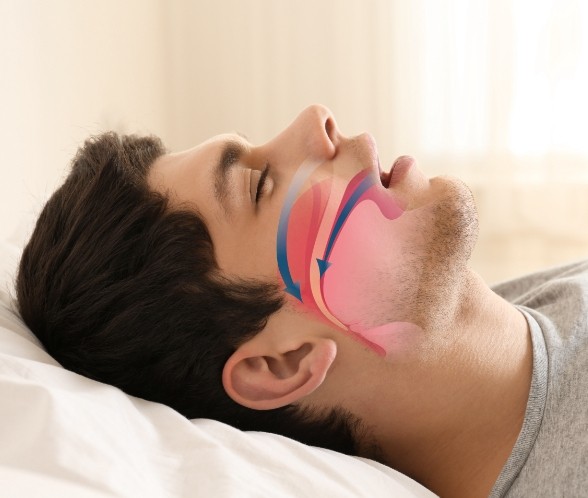According to the American Sleep Apnea Association, an estimated 22 million people in the country suffer from breathing disorders that not only impact their quality of rest, but also their overall health. Dr. Mahn first took interest in treating these issues years ago, and since then, he has completed specialized training, and is an active member of the American Academy of Dental Sleep Medicine. He is also the author of the educational booklet, A Breath of Health, that has helped countless patients learn more about their condition.
What Causes Airway Disorders?
Airway disorders can be a result of several different underlying problems and have a drastic impact on your day-to-day life the longer you live with them. Some of the most common underlying issues that can result in them include:
- Excessive weight and fat deposits located around the neck, which can restrict the airway.
- Patients who are 60 or older are at a higher risk of airway disorders.
- Some patients naturally have narrowed airways that restrict their breathing.
- Obstructed airways are a common condition in people with high blood pressure.
- Patients with chronic nasal congestion can have airway issues.
- Airway disorders are commonly seen in patients who smoke, have diabetes, and have asthma.
Signs of Airway Disorders
Dr. Mahn uses advanced diagnostic technology to ensure that all of his patients are accurately diagnosed for any airway disorders that they may have. However, before many patients enter our office, they keep an eye out for common signs that they could need airway management at home. Some of the most noticeable symptoms of this problem that patients experience include:
- Gasping or choking in sleep
- Neck, shoulder, or back pain
- Chronic migraines or headaches
- High blood pressure
- Bite problems
- Weight gain, specifically around the head and neck areas
- Chronic fatigue
- Mouth breathing and chapped lips
- Chronic snoring
- Teeth grinding and jaw clenching
Women Are Different
Many women have a condition known as Upper Airway Resistance Syndrome (UARS), a milder form of impaired night time breathing. That means additional effort is required to breathe. Even though this condition generally DOES NOT show up on a sleep study, the health consequences are devastating. The body goes into “fight or flight” (sympathetic) mode. Increased levels of cortisol create a highly inflammatory environment and the body is unable to regenerate and heal. The result … symptoms such as adrenal fatigue, reduced immune function, unexplained weight gain, exhaustion and inability to concentrate.




